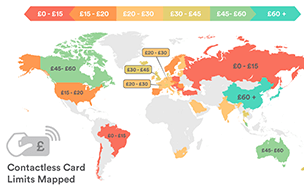
- The UK now one of the worst-affected countries
- Business growth, reputation and revenue all suffer
- AI-powered fraud already popular and on the rise
- More businesses turn to machine learning automation to fight back
The UK is fast becoming a global hotspot for online fraud, which is having a devastating impact on both businesses and the economy.
New research from fraud prevention platform Ravelin shows online fraud is increasing globally but has grown more in the UK in the last 12 months than any of the ten countries surveyed, including France, Germany, Italy, America, Brazil, Australia, and Mexico.
One in four of the businesses polled by Ravelin say they lose over $15m (£12m) to fraud every year.
The explosion in online fraud threatens to hamper economic growth. Over half of respondents (51.8%) say fraud is stifling the growth of their company, leading to wider knock-on impacts.
Ravelin’s Fraud and Payments Survey, now in its fourth year, reveals a highly challenging business landscape in the UK with 84% of merchants confirming fraud has increased, followed by Australia Australia (83.4%) and Spain (81.3%). Globally, fraud has increased for 74.8% of businesses in the past 12 months.
Reputations, revenue, and in turn stock value are also taking a hit as amateur and professional fraudsters adopt new tactics, techniques and technologies to steal from brands.
Companies’ growth is stifled by fraud across the board (51.8%) and 19.9% say stock price is damaged. Well over a third of businesses (40.4%) say their brand image is affected. In the UK, 61.1% of businesses have been mentioned in the press or on social media in relation to fraud. In Australia, 83.3% have suffered this kind of negative publicity.
Growth, revenue, and reputation are far from the only things impacted by the rise in fraud. Staff morale can be affected, with nearly a quarter (24.3%) saying this is an issue. Over a third (36.9%) say it hurts customer loyalty while 37.1% of merchants say fraud has driven poor customer satisfaction and churn.
Ravelin CEO Martin Sweeney said, “Online fraud shows no signs of slowing down. The speed of adoption of new tactics and technologies such as AI by fraudsters, both amateur and professional, is happening at breakneck speed. The democratization of fraud affects us all.
“Many merchants are deeply concerned about the impact on revenue, growth and reputation so it’s crucial to be fully up to speed with the idiosyncrasies and trends of this fast-changing fraud landscape.
“Across fraud leaders in our four key sectors of the market, machine learning
was once again recognised as integral to fraud fighting efficiency. Machine learning models and features offer flexibility and scalability in the face of transforming threats.”
Fraud trends – what’s powering the global growth of fraud?
AI-powered fraud
Predictions about artificial intelligence-enabled fraud have been everywhere. According to the Ravelin report, it’s well and truly here, with nearly two-thirds of merchants (63.6%) having seen criminals use AI technology against them (inclusive of large language models (LLMs), machine learning, synthetic IDs and other applications).
Respondents are concerned that AI-powered fraud will impact growth (50.5%), brand image (39.8%) and customer loyalty (39.2%).
Friendly fraud
First-party fraud (also called ‘friendly fraud’) is also on the rise in many parts of the world. Topping the list for friendly fraudsters are the UK, Australia, and Spain, up to 54.4% of merchants estimating customers are now more likely to attempt fraud.
Unsurprisingly, many merchants (58.6%) agree they must do more to tackle fraud but are often prevented from doing so because of budgetary (39.4%) concerns, or concerns that it could introduce friction that will cause customers to churn (38.2%) – which is not the case with tech-forward solutions. Another key blocker is a lack of awareness of the benefits from other outside teams (35.9%).
Solutions – how companies are fighting back
Automation in the form of machine learning is widely seen (66.2%) as the most useful implementation of AI for fraud prevention, ahead of LLMs (46%), generative adversarial networks (GANs) (38.7%) and big data analytics (36.8%).
Across the board, two-factor authentication (2FA) – which includes technologies such as 3D Secure and biometric verification – is the most popular fraud-thwarting tool (54.1%).Martin Sweeney added: “In our industry, knowledge-sharing is one of the most powerful tools in our arsenal so we hope the insights we’ve gathered in our latest report will help inform new thinking and approaches about tackling online fraud.”

























